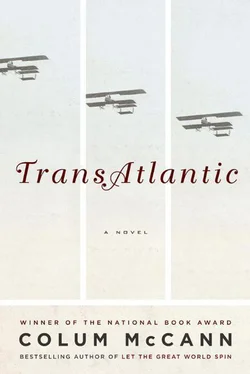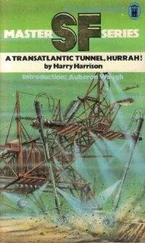— Don’t forget to phone your mother and father.
— Stepfather.
— Tell them we’ll be out for the weekend.
— Ach, Nana, please.
He loves the cottage out at Strangford Lough, but dislikes his stepfather’s hunting weekend with a passion, poor boy. Hannah’s husband is a gentleman farmer, and he has arranged it for many years, first weekend in September, duck season. More of a Tuttle than the Tuttles themselves.
Tomas darts his eyes heavenward, smiles, ambles down the steps towards the garden flat. Glad now, she’s sure, to get away.
— Oh. And Tomas?
— Aye, Nana?
— Find yourself a girlfriend for crying out loud.
— Who’s to say I don’t already?
He grins and disappears. She hears the basement door close, and she climbs, alone, to the house. A scraggly dog rose runs up along the steps to the house. A city flower. A climber. Yellow with a small red center. Every bloom with its own little violence.
Lottie stops in the stained-glass doorway. Puts her key in the wobbly latch. The paint is chipping from around the letterbox, and the base of the door has begun to crack. Hard to fathom, but it is almost fifty years since she first stepped through these very doors. Back then it was all fine silverware and high bookcases and shelves lined with delicate Belleek china. Now it’s smoke-tarred lightbulbs. Water stains. Peeling wallpaper. She shouts out a greeting to Ambrose but there’s no reply. The door of the living room is slightly ajar. He is at his desk, the round white of his dome shining. Hunkered down into the checkbook, stacks of papers scattered all around him. Deaf as a post. She leaves him be, steps along the squeaky floorboards, past the gauntlet of her recent watercolors, some of her old photographs, into the kitchen, where she drops her keys, runs the tap, fills the pot, lights the stove, waits for the whistle. Some chocolate biscuits, why not? Four of them on a plate, the sugar, the milk jug, the pair of spoons nestled together.
She elbows the door gently, goes quietly across the worn carpet. A row of tennis trophies on the shelf to the side of the mantel. Mixed doubles, all. She was never one for singles. Always liked the company of a man, though she was tall and strong, known for taking the back court at times. Could whip the backhand down the line. Always loved, afterwards, the dinners in the clubhouse. The champagne toasts, the trill of laughter, cars weaving down the road in a firefly line of headlights.
Ambrose is startled when she slides the tray onto the edge of his desk, sends a fountain pen rolling towards his lap. A curmudgeonly grunt, but he catches the pen in midflight. She kisses the cool of his temple near a bloom of dark skin. She should bring him to see a dermatologist one of these days. Small isolated continents mottling his scalp.
His desk is an endless stretch of debt. Bank statements. Canceled checks. Letters from creditors.
She leans her chin on the top of his dome and kneads the ample flesh of his shoulders until he loosens a little, and allows his head to fall back against her. She can feel his hand stretch the round of her bottom, happy to see he’s still capable of adventure.
— So how was Stranmillis?
— He’s ready for center court. Any day now.
— A good wee lad.
— We crashed a checkpoint on the way home. A high-speed chase.
— Is that so?
— We lost them in Crazy Prices. Down by the fruit aisle.
— They’ll get you yet, he says. You can’t escape.
He taps her rump as if to prove his point, then settles back down to the checkbook. Lottie pours the tea, the greatest Irish art of them all. She has learned through the years to get the best of the leaves, to soak, to stew, to pour. Even when she lived in England there was never as much fuss made of the tea. She drags a chair beside him, to peer around his shoulder. The linen business went bust a long time ago. Nothing now but empty halls and broken pails and the ghosts of some ancient looms. They inherited it all. The curse of privilege. Janitors for the ambitions of the dead.
Still and all, there’s just enough in the kitty to get by. His RAF pension. The cottage out at Strangford Lough. The investments, the savings. She wishes Ambrose wouldn’t worry so much, that she could coax a longer laugh out of him, that he would rise from the desk and leave it behind, if only for a moment or two, but he is a secret worrier. The crash of ’29. They were hardly out of their wedding clothes. The Great Slump. He left the RAF, returned to Belfast. Linen for parachute harnesses and airplane wings. Military gliders, light reconnaissance. They soon disappeared. The business took a nosedive. Then it was linen for the war effort. An ill-advised venture into lacy handkerchiefs. Her photography fell by the wayside after the war, dissolving away in the chemicals of the time, a child, a business, a marriage. Lottie even worked in the factory office in the 1950s and early ’60s, plied her way amongst the looms and the lonesome pitch of the afternoon factory horn, sad beyond all telling.
She drains the last of her tea and puts her arm around the back of his chair. A clockchime from the hallway.
— Our Tomas might have a girlfriend.
— Is that so?
— Maybe, maybe not.
— Is that a hint?
She laughs, takes his arm and he rises. His cardigan, his open shirt, the sag of his trousers. In every pocket he carries pencils and pads of paper, crumbs of yesterday and tomorrow. The little tuft of gray hair at his chest. Still, there is something impish about him yet. An ability for youth. He caps the fountain pen and shuts the account books, and they move out into the dark of the corridor, towards the stairs.
TWICE BY SHIP, once by plane. They traveled together. The first was to visit her mother, back in the Cochrane Hotel. A vicious wind blew off the Atlantic. They stood on the deck, wrapped in blankets. Lottie leaned against the railing. Ambrose stood behind her. He never cared that she was a full head taller than him. There were times she worried that he was just holding some secret grief, burying his head against her shoulder, that they were locked in an interdependence that would someday shatter in sorrow. They docked in Boston and then rode the railroad along the Eastern Seaboard. Her mother was virtually immobile then: she lived in a chair in her room, but still wrote — plays mostly. Short, sharp, funny pieces that were performed by a troupe on Gilbert Street. An immigrant theater. Macedonians, Irish, Turks. Her mother sat in the rear seats in her knit hat, watching, hands folded into one another, white on her dark dress. Theater was a new form for Emily. She enjoyed it immensely, though the seats were mostly empty. One afternoon they drove together to Lester’s Field and paced the length of the overgrown grass. The runway was inhabited now by sheep.
The second visit was in 1934, two months after her mother’s death, to clear up her affairs. Lottie couldn’t bring herself to throw away the boxes of Emily’s papers. She packed them in the trunk of a car and drove all the way to northern Missouri. There were no ice farms anymore. She and Ambrose slept in a small roadside motel. She left the boxes on the steps of a local library. She wondered for years what had happened to the papers. Most likely burned, or blown away. When she returned to Belfast she took along her own negatives, watched Alcock climb from a bath of chemicals. She liked the notion of him rising from the dark.
Their last journey was in 1959, on their thirtieth wedding anniversary, when they took a plane from London to Paris, then Paris to Toronto, then Toronto to New York, where Ambrose had business with the linen dealers on White Street. They spent much of their savings on a first-class ticket. They tucked the serviettes at their throats and looked out the window at the shifting cloth of cloud. It amazed Lottie to think that she could get a gin and tonic at twenty thousand feet in the air. She lit a cigarette, nestled close to Ambrose, fell asleep with her head against his shoulder. She took no photographs on that trip. She wanted to see how well it could be put together by memory alone.
Читать дальше












